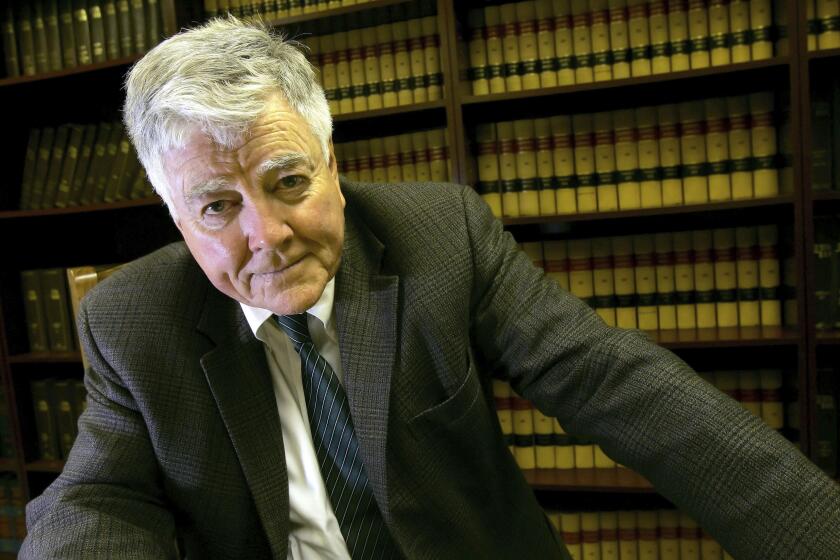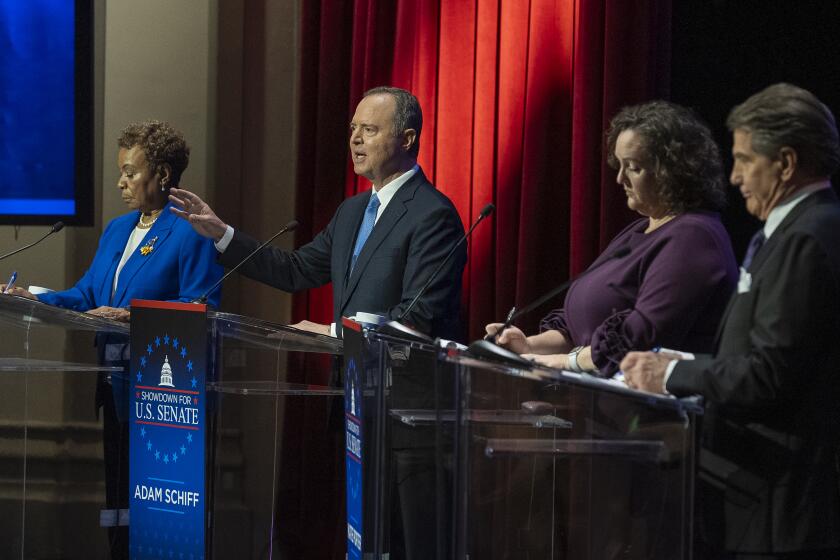Governor Ties Highway Bond Fate to Gann Funding Plan
Gov. George Deukmejian is now saying that if the Legislature rejects a $1-billion transportation bond proposal he is pushing, he may well support a controversial highway funding initiative being sponsored by anti-tax crusader Paul Gann.
Deukmejian told Times reporters in an interview last week that he likely will oppose the Gann initiative if the Legislature puts his transportation bond measure on the ballot.
But that would change if the Legislature rejects his highway funding plan, which must also be approved by voters, Deukmejian said.
“If we don’t get our bond proposal, then that’s a very attractive option,” Deukmejian said, referring to the Gann initiative, which has already qualified for the June 7 primary election ballot.
‘Pushing, Shoving, Cajoling’
The same message has been conveyed to legislative leaders.
Assembly Speaker Pro Tem Mike Roos (D-Los Angeles) said the governor’s comments “underscore how anxious he is” to win support for his transportation bond plan, still opposed by Roos and other Assembly Democrats. “He’s been pushing, shoving and cajoling us,” Roos said.
Though Roos sees Deukmejian’s comments as a negotiating ploy, he said he is taking the governor’s warning seriously. Roos, like many other Democrats, has strong reservations about the Gann measure, although few have yet taken a public position.
Deukmejian’s bond measure is stalled in the Legislature. It is being held up pending agreement on a record $5-billion bond package aimed at providing more money to build prisons, schools, water and sewage projects, low-cost housing, new libraries and highways as well as the governor’s transportation measure.
Weeks of Negotiations
Deukmejian has been conducting closed-door negotiating sessions with Republican and Democratic leaders for several weeks.
If there is no agreement, and Deukmejian ultimately supports the Gann measure, it would provide a major boost to an initiative that so far has received a cool reception in the Capitol.
Deukmejian, like other political leaders, has mixed feelings about the Gann measure.
On the plus side, it would pump billions of new dollars into highway projects over a period of years, something that both Deukmejian and legislative leaders say is needed to address California’s steadily worsening traffic congestion problems.
However, the money to finance the programs, beginning at about $600 million a year, would come from the state’s pool of general tax revenues, money that now goes to education, health, prison and other programs.
Deukmejian Chief of Staff Michael R. Frost said: “That $600 million now is being used for other purposes. It would have to come from somewhere.
“The governor believes that his proposal is superior to Gann and should be adopted,” Frost said. “But if his proposal is defeated in the Legislature, Gann becomes the only game in town. Since we have to get additional money for transportation programs, the governor may be forced into supporting Gann even though we have some reservations about it.”
Another provision of the Gann initiative would require that a share of the general tax revenues be used to fund a budget reserve of about $1.3 billion. That is roughly what Deukmejian sets aside in a reserve every year, but Deukmejian has indicated that he would like to retain the option of deciding how large the reserve will be based on overall budget priorities.
Would Raise Spending Limit
The initiative goes even further by declaring that the revenues going into the reserve would not be counted in calculations that decide the spending limit.
With the state now right at the spending limit, that would mean that the expenditure ceiling would be raised by about $1.3 billion, a prospect Deukmejian is not enthusiastic about. Gann was the author of the 1979 initiative that put the spending limit in the state Constitution.
In his comments to Times reporters over breakfast, Deukmejian said he is not likely to support both his own transportation bond measure and the Gann initiative.
“I would be less likely to support the Gann initiative if we get our transportation bond because I’d be going to the public and urging them to support our transportation proposal,” Deukmejian said.
First Installment
The governor’s $1-billion bond measure is the first installment on a two-part proposal to raise $2.3 billion for highway construction and mass transit projects.
Deukmejian hopes to follow this year’s measure by putting a $1.3-billion proposal on the ballot in 1990. The two measures would increase the money available for new transportation projects by 40%. That money would be in addition to the $3.5 billion Deukmejian has budgeted for state transportation projects in the new fiscal year that will begin July 1.
Deukmejian said the $2.3 billion raised by the bonds would satisfy the state’s needs for the immediate future. “That would be as much as we could ask for and I wouldn’t want to be going to the public and asking them to also support the Gann transportation initiative,” the governor said.
Deukmejian wants to raise the money for highways by issuing short-term bonds that would be paid off from general tax revenues, rather than dedicating a fixed share of tax revenues or raising taxes to finance the bonds.
Although the Senate approved Deukmejian’s plan in a bipartisan vote, the governor’s approach has encountered stiff resistance from Democrats in the Assembly.
Assembly Democrats want to pay off the bonds with gasoline tax revenues and user fees, the traditional method for funding highway projects. They say that using general purpose revenues would mean taking money away from health, education and other state programs.
Assemblyman Richard Katz (D-Sepulveda), chairman of the Assembly Transportation Committee, is pushing a rival measure that would use gasoline tax revenues and user fees to pay off the bonds.
Katz estimates that interest costs over the life of the bonds mean that “$1.5 billion would be taken away from schools and health care and cities and counties. We don’t think you should rob the future to pay for today’s problems.”
Other Issues
The dispute over transportation bonds is not the only issue standing in the way of an agreement between Deukmejian and the Legislature.
Fighting for a spot on the ballot with the governor’s $1-billion transportation bond measure is a $1.6-billion bond proposal for new public school construction that has strong support from both the governor and legislators.
Also on the negotiating table is a prison construction bond measure ($850 million), various clean water and sewage treatment proposals ($600 million) and a $750-million measure to provide temporary shelter to the homeless. In addition, there is strong pressure for a $250-million bond measure earmarked for library construction and another for $300 million that would be used to strengthen public buildings that do not meet earthquake safety standards.
A fairly strong consensus has developed in the Capitol that the size of the bond package must be held to about $5 billion in order to protect the state’s AAA bond rating, meaning that some of the proposals will either have to be pared back or eliminated.
More to Read
Get the L.A. Times Politics newsletter
Deeply reported insights into legislation, politics and policy from Sacramento, Washington and beyond. In your inbox three times per week.
You may occasionally receive promotional content from the Los Angeles Times.






